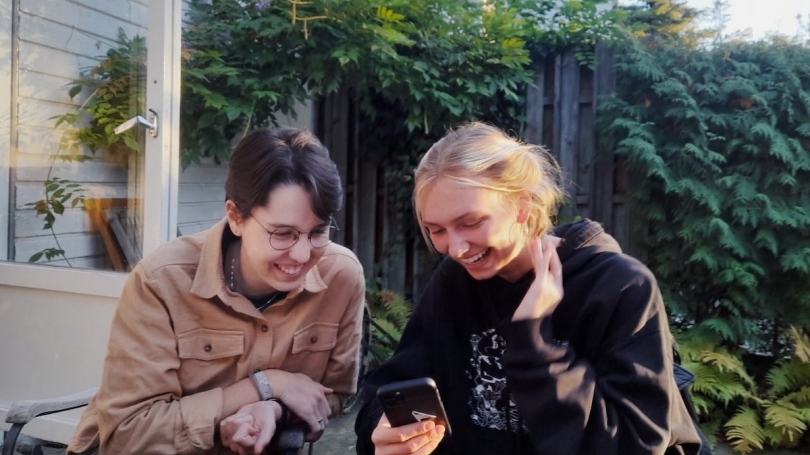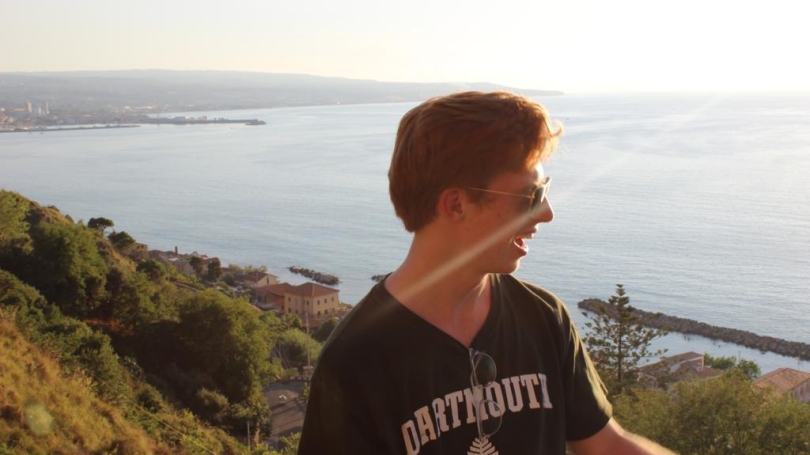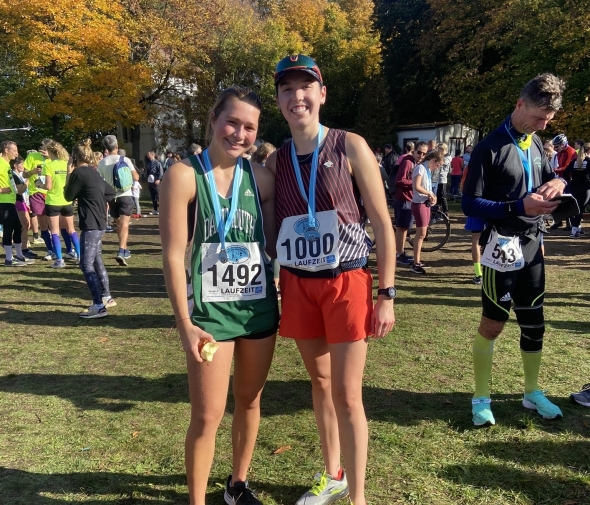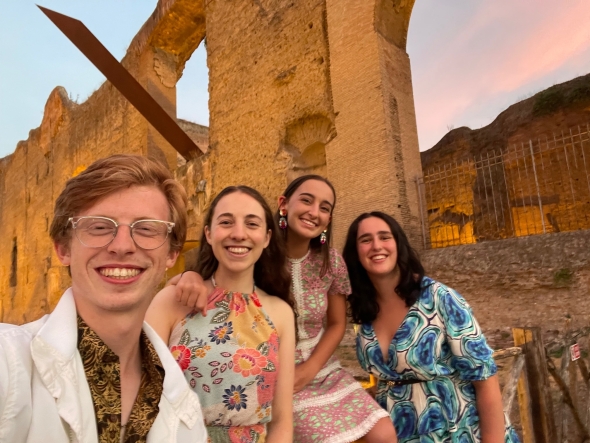

Faculty often hear from students that Dartmouth's advanced language immersion programs benefit their mental health.
When Sasha Usher '25 signed up to study abroad in Berlin during their sophomore fall, they hoped to improve their German language skills while also learning how to navigate a new country. What they didn't anticipate was the immense positive impact the experience had on their mental and emotional health.
"I never would've expected the kind of growth that happened by nature of having that much freedom in a country," says Usher, who hails from Boulder, Colo. "I seriously think it was one of the most formative weeks I've had in my life."
Usher's experience sounds familiar to German Studies professor Gerd Gemünden. This past year, as he reviewed student evaluations of the department's Language Study Abroad and Foreign Study Program, both of which are conducted entirely in German, a theme caught his attention.
"Usually students say they enjoy the experience of being abroad and leaving a familiar environment behind," Gemünden says. "But there were several who specifically mentioned that they felt like it was a benefit to their mental health."
"More than before, we hear student testimony that advanced study abroad makes them freer to be themselves, not despite but because of being in another language and culture," says professor Yuliya Komska, chair of the Department of German Studies.
This boost to students' mental health syncs with the department's recent focus on wellness. Last fall, professors Heidi Denzel and Nicolay Ostrau, director of the German language program, launched an innovative pilot program that infuses introductory German classes with wellness practices such as mindfulness and guided meditation.
While the intention of off-campus programs has always been to immerse students in the languages and cultures of other countries to enrich their education and lives, Gemünden was struck by the degree to which students said the program boosted their social and emotional well-being.
"I'd never thought of our abroad programs serving that kind of purpose," Gemünden says. "The programs have come to serve a function that goes much beyond the acquisition of language or turning our students into more global, mature, well-rounded people."
Freedom to Slow Down
Advanced language study-abroad programs such as German Studies' new, hybrid Language Study Abroad and Foreign Study Program and the Department of French and Italian's Full Immersion in Rome Experience boost students' mental health in distinct ways, say Usher and Gemünden.
First, the programs provide students with a greater sense of independence than ever before.
"As I learned Italian, I also learned new cultural norms, values, and ways of life," says Sohini Mandal '26 of her experience in Rome. "I became more independent and gained insight into who I am as an adult. In this way, studying abroad was a welcome reprieve from the traditional pressures of campus life."

"There is just a whole other level of independence that I don't think many of us had experienced before," Usher says. "The Berlin program is organized in a kind of choose-your-own adventure way, instead of being hyper-structured where you're all together all the time. We had our class, and then we pretty much just did whatever we wanted for most of the day."
This meant learning how to "think on my feet" in a foreign city and finding the people "who make me feel comfortable right now," Usher says. "You really had to be intentional about the connections you were forming. How am I going to make a place for myself here?"
Alice Cook '25 agrees that the independence afforded her on the Berlin FSP was formative.
"After a lot of time at home during the pandemic and after choosing a college in a pretty familiar environment, Berlin helped me explore more," she says. "I got comfortable with city life, riding public transit, and coordinating my own activities with other students. At the end of the program, I spent a week traveling by myself in southern Germany, which was definitely something I wasn't prepared to do prior to beginning the program."
Cook adds that the program's structure also helped students learn how to manage their social lives in a way they hadn't before.
"I think the program was a great opportunity to get better at setting our own schedules and figuring out how to create experiences that we wanted for ourselves," she explains. "We had a lot of free time, which meant that we had many opportunities to schedule museum visits, outdoor time, and other fun activities around the city. At the same time, we had to figure out the right balance between being active and spending time together and also having time to ourselves, which is something that I think the group got better at as the program went on, just by communicating and creating many different opt-in things to do."
Gemünden notes that the relocation also enables students to unplug from the constant check-ins with friends and family back home and gradually cures the "fear of missing out" that can occur from social media.
"They begin to appreciate the opportunities and possibilities that they have in front of them," he says. "They can disconnect. "
"Rome taught me how to slow down and appreciate more things about life that I had slandered as too banal," says Chase Harvey '25.
Students are encouraged to explore the city around them and learn how to get around on their own, fostering general feelings of pride and accomplishment.
"It was surprising how many of them explored entirely on their own or in pairs of two," Gemünden says. "They went to places that were off the map. One assignment was to describe their favorite spot in Berlin that's not on the top 20 list of things to see. It was quite remarkable seeing what they discovered and what a meaningful experience meant to them. Most of them enjoyed just walking around and looking and taking pictures and getting lost."

Usher points out that being abroad was also extremely "freeing," as "you can be whoever you want to be for the first time." And equally as important, they add, you have the freedom to fail.
"I think the person that Dartmouth attracts is someone who has very high standards for themselves," Usher explains. "But to be able to accept failure in a lot of different aspects of life is so important, and it was one of the biggest takeaways. It was a lot of trial and error: 'Yeah, I might've read that map wrong; I completely botched that conjugation; I don't know how to say that word; I don't know how to communicate what I need.'"
Forming Crucial Connections
The opportunity to form a bond with the host family, with other Dartmouth students, or with other individuals in the city was also beneficial for many participants. Not only do these relationships strengthen students' social skills, but they also open students' eyes to other ways of living and provide a sense of belonging and community.
"Being in another culture made me feel free from the expectations of the culture I knew well back home in the U.S.," says Harvey. "Rome made me realize that there are other methods for going about how one can live life."
Gemünden recalls one student who self-identified as bipolar prior to the start of a Berlin FSP. "That student felt very warmly received by their host family, and talked about how they were really blooming while staying with that host family and experiencing a completely different kind of life."
Harvey credits the Rome program with helping him learn how to form deep, long-lasting relationships. "I think I learned how valuable my friendships are," he says. "My friends from that program are some of my closest and most cherished friends ever."

Usher's host was a friendly octogenarian who had opened her doors to two other students in their 20s and 30s from the country of Georgia.
"It was the weirdest combination of people in this small Berlin townhouse, but it was incredible," Usher says. "We had great conversations. All of us lived very independent lives of one another, but we could come back and have these lovely conversations. It was only 10 weeks, but it was so formative. These people had an amazing influence on what I decide to study, who I decide to be as an adult, and where I decide to go."